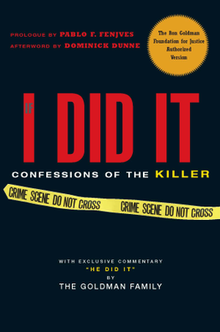Why Trump uses the O.J. Simpson “If I did it”-style subjunctive denial

Donald Trump wrote a statement about the coup on January 6 — saying if he staged a coup, he’d do it differently. His language reminds me of O.J. Simpson — and shows why “If I did it” makes you look guilty to those who hate you, and heroic to those who support you.
Simpson’s subjunctive denial
The subjunctive form is a hypothetical way of speaking. For example, if I say “If I were a rich man,” what follows is a subjunctive — a description of a hypothetical world that’s not real.
Former football player O.J. Simpson wrote a subjunctive book called If I Did it about his hypothetical murders of his ex-wife Nicole Brown Simpson and Ronald Goldman. In it, Simpson describes how he would have done the murders in chapter that he described as fiction. Simpson was acquitted of the murders in a criminal court, but held responsible in a civil trial. But by writing a hypothetical book about the murders, he reinforced everyone’s idea that he killed Goldman and his ex-wife. (A court later awarded the rights to the book to the Goldman family, which published an edition with their own commentary.)
Subjunctive denial describes the O.J. Simpson-type statement — “I didn’t do it, but if I did, here’s how I would have done it.”
Trump, like Simpson, uses the subjunctive denial
Trump has adopted the subjunctive denial repeatedly to describe actions he’s accused of. He says, in effect, “If I did this, I would have done it differently.”
For example, in the new book I Alone Can Fix It, Washington Post reporters write that in January, Donald Trump discussed a coup with General Mark Milley, Chairman of the Joint Chiefs of Staff of the US Armed Forces. In response, Trump issued a statement that includes the following text:
I never threatened, or spoke about, to anyone, a coup of our Government. So ridiculous! Sorry to inform you, but an Election is my form of “coup,” and if I was going to do a coup, one of the last people I would want to do it with is General Mark Milley. . . .
Had he said that [he was proud to walk to St. John’s church with me], it would have all been over, no big deal, but I saw at that moment he had no courage or skill, certainly not the type of person I would be talking “coup” with. I’m not into coups!
It’s a subjunctive denial — if I did it, I would have done it differently.
This isn’t Trump’s first subjunctive denial — he used the same tactic regarding accusations of sexual assault. For example, in denying that he assaulted Jessica Leeds, he said “Believe me, she would not be my first choice,” and in denying kissing Natasha Stoynoff against her will, he said she was not attractive enough to assault. Similarly, when accused of raping writer E. Jean Carroll, he said she was “not my type.” The impression you get is that he’d certainly assault women, but not these particular ones because they weren’t attractive.
Why use subjunctive denials? Consider two audiences:
- For those who think whatever you’re accused of was actually defensible (in this case, the coup), the denials are transparent. Those folks can see past them and embrace the hypothetical.
- For those who think whatever you’re accused of is terrible, they’re already against you. The subjunctive denial can’t make it any worse.
Legally speaking, Simpson, Trump the accused rapist, and Trump the accused plotter of coups have not incriminated themselves. Since the “admission” is hypothetical, it doesn’t count as testimony.
The subjunctive denial is a tactic for the guilty
Here’s my recommendation: If you are accused of something serious, don’t say the accusation is wrong because if you did it, you would have done it differently. That’s not at all convincing. It makes you look guilty.
If you’re accused and want to defend yourself, provide evidence of your innocence.
Because any sentence that starts “If I did it” is not going to exonerate you.
I’d love to see the look on his face if you asked hiim, “Why did you use the subjunctive?” 😉
Also to be noted… what Trump considered to be an insult to Milley was actually a compliment to Milley’s integrity.